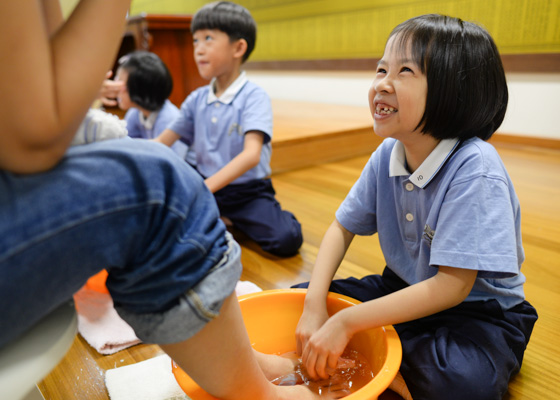Speaker Shi Shu Juan, currently an assistant professor specializing in child development and home education at Taiwan’s Tzu Chi University, shared her knowledge on how to determine a child’s temperament with parents and teachers. (Photo by Huang Si Ni)
One of the most important things that parents must learn is to truly understand their children. Parents can only properly communicate and interact with their children when they have an in-depth understanding of their temperaments.
The Tzu Chi Great Love PreSchool organized a parental education talk for the very first time on 11 July, 2015. A total of thirty-nine parents and teachers attended the talk, where they gained a deeper understanding of the different temperaments of children and learned how they could interact with them more positively so that their growth and development could take place in a constructive environment.
The invited speaker, Shi Shu Juan, is currently an assistant professor specializing in child development and home education at Taiwan’s Tzu Chi University. Along with her were seven students from the university who were on internship at the PreSchool from 8 – 17 July, 2015.
Shi has many years of experience in early childhood education, and believes firmly that home education and the parent-child relationship has a deep impact on a child’s development as well as on many societal problems.
Emotion Management for Parents, Teachers, and Students
To understand a child’s unique character, one can start from observing his activity levels and natural curiosity or avoidance of the unknown, ability to deal with changes, determination, intensity of response towards stimuli, self-discipline, sensitivity, and his natural emotional makeup.
“(Those who are) irritable upon getting out of bed, at the end of the day, and before going to bed, would find it hard to adapt to new environments and display inappropriate actions to resist the environmental constraints faced, have frequent disagreements with playmates, and like to instruct and control others……these are the signs of a child with low adaptability,” said Shi. With the help of abundant examples from daily life, Shi explained the eight main categories of temperaments.
Her audience listened in rapt attention, some nodding their heads in agreement while others busily took notes. They all pondered over the question: “Which temperament describes my child best?”
Parent Zhong Li Ting noted that the talk enabled her to have a better grasp of her children’s emotions. She realized that when it came to her daughter who was inclined to throw tantrums, she would have to keep her own emotions under control and seek to understand and communicate. The outcome at stake was not only the child’s development, but also a report card of the parent’s effectiveness in managing their child.
In her talk, Shi introduced a concept to her audience: educating a child is not a one-way street; parents are also continuously on the process of making self-improvements, hence a parent’s “report card” must be graded by their child. She suggested that both parents and their children should learn emotional management. The process of “observing and distinguishing”, “displaying” emotion, and “understanding” the reasons behind what happens enables one to regulate one’s emotions more effectively.
In order to guide their child through the process of recognizing their individual temperaments, to showing concern for and understanding those of others, parents must first provide a home environment that is open, accepting, warm, and safe. Then through leading by example, they can educate their child in a positive manner. Parent-child interactions must be immediate in order to be effective, and in our daily life there is no lack of examples to be used as “live curriculum”.
Don’t Be a Procrastinating Parent
Shi shared the story of Dong Dong from a children’s picture book, to illustrate her point that the greatest love on earth is familial love, therefore parents must never use the word “later” on their children and should instead afford immediate replies to their children’s needs. In the story, whenever a little boy named Dong Dong looked for his parents, he would receive the same reply: “Dong Dong, wait awhile. I have no time now.” Even when he told his parents that there was a strange beast that wanted to devour him, his mother was unmoved. The little boy was eventually devoured by the beast, yet even when it entered his home and took his place, his parents were clueless and told the beast: “Dong Dong, wait awhile. I have no time now.”
Shi urged her audience not to be “procrastinating parents”; acknowledging that there may be times that parents may be tied up with work or emergencies, she advised that they should tell their children that they would attend to them once they have finished their task. However, she also cautioned that such a response should not be employed too frequently or the distance between parent and child would only become wider.
In response to a question posed by a parent whose child had been enrolled in the Tzu Chi Great Love PreSchool for a year but still engaged in bouts of crying every morning when brought to school, Shi suggested that the parent could reward the child materially for short periods of good behaviour. Subsequently, the parent could reward the child over longer periods through actions such as a hug or words of encouragement such as “You are great!” etc. This will gradually enable the child to shed his bad habits. Shi recommended that parents should continually interact with their child and think of appropriate ways to manage and help their child, otherwise they will be hard to control once they reach adolescence.
“How do we develop a child’s focus? For example, in cases where the child lacks concentration in reading a book,” asked a parent. Shi replied that developing a child’s concentration starts from the activities that a child likes and encouraged parents to observe what sparks their child’s interest in order to nurture their focus. When their child meets an obstacle in the activity, parents can step in to help so that the child can continue to focus on the activity.
Member of the audience Ou Li Zhen has a three-year-old child and was seen busily scribbling down notes during the talk. In order not to miss out on learning how to be a responsible parent and teach her child emotional management, she had left him in the care of relatives in order to attend the talk. “Today I learnt that not every child likes to read, (one should) first find out what the child likes to do,” she said with conviction.
Nearing the conclusion of the talk, the attendees eagerly peppered Shi with questions which she answered with her own wealth of experience. From her sharing, parents realized that they were role models for their own children. This is testament to the wisdom of a Jing Si Aphorism, which states that are no “bad children” as such, just parents who have not found the right way of teaching their offspring. Be it teacher or parent, both play important roles in educating the young and are crucial in the foundation of building family harmony.
At the parental education talk, Shi also explained how to create a win-win home environment. (Photo by Huang Si Ni)
Parent Ou Li Zhen (left) expressed her view that parents must first understand a child’s character and interests in order to improve on their own parenting style. (Photo by Huang Si Ni)
Parents took the opportunity to clear their doubts and peppered Shi with questions. (Photo by Huang Si Ni)



